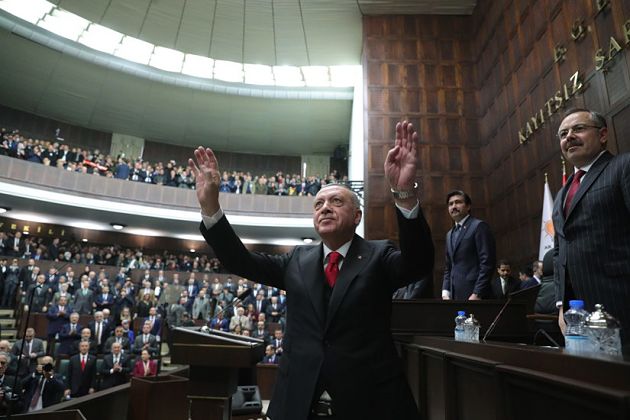Our previous article on Ankara’s behavior in Idlib (https://golosislama.com/news.php?id=38046) was positively received by the majority of our regular readers, but it also received some critical feedback. Well, the situation is not static, so let’s examine its dynamics.
Let’s start with the bad news. Yes, despite some readers’ outrage at our words, we are ready to reiterate that for a country like Turkey, its reaction to the killing of its soldiers by the Assad regime seemed unconvincing. Yes, there have been attacks by Assad’s forces, but the grand claims of hundreds of casualties seem not only unconvincing, but also unprofessional, given the lack of evidence to support them, similar to the Iranian regime’s claims of hundreds of dead American soldiers in response to the counterstrike on its base in Iraq after the killing of Qasem Soleimani.
By the way, speaking of Soleimani again, his elimination by the Americans in response to attacks on their military personnel in Iraq is an example of an appropriate reaction by a serious power in such a situation. Unfortunately, Turkey is not demonstrating this — yes, yesterday an Assad helicopter with some brigade general at the controls was shot down, but the regime has plenty of those brigade generals like mud, and they can afford to send them to their deaths without considering such losses. Moreover, the Turkish forces were attacked again in response and suffered losses.
In his speech to his group today, Erdogan once again declared that Turkey will now respond harshly to any attack on its military, not only in Idlib, but throughout Syria. It sounds promising, but there is a catch — Erdogan has made many similar statements in the past, repeatedly promising to take Manbij from the Kurdish communists, which they never did, so such statements are already perceived as the 1001st Chinese warning. On the other hand, the Americans didn’t throw words to the wind, they simply acted and showed that they don’t tolerate jokes. By the way, about the Americans.
Against the background of Ankara’s rather helpless reaction (what can one say when the Chief of General Staff, Hulusi Akar, says that NATO intervention is necessary to stop Assad), there are now reasons to hope that they can effectively intervene in the situation. At least in the context of disappointment with the Turkish establishment and society’s alliance with Russia, the Americans are taking demonstrative steps towards Turkey. As a gesture of solidarity with Turkey regarding Syria, the White House lifted the sanctions previously imposed on Turkish ministers and suspended the criminal case regarding the high-profile case of financing Iran through the Turkish bank «Halkbank», which was seen as undermining Erdogan personally. They also declared that further attacks on a NATO member in Syria were unacceptable. In principle, realistically speaking, the Americans are capable of doing in Syria what the Turks are reluctant to do, but they will undoubtedly demand a price for it in the form of Turkey breaking off its cooperation with Russia and Iran.
Considering that this cooperation has been built up over the past few years, it would be too high a price to pay for Idlib now, not to mention acknowledging the mistake of Erdogan’s foreign policy zigzags. On the other hand, by behaving this way, the partners in Moscow and Tehran clearly show that they don’t value their relationship with Turkey and consider it dependent on them amid deteriorating relations with the West (it won’t disappear anywhere now). Therefore, the current crisis is not only Turkey’s policy in Syria, but its policy of balancing between two poles — the U.S. on one side and Russia and Iran on the other.
As far as Syria is concerned, the conflict in Idlib, as predicted by some observers, is likely to freeze along the M4/M5 highways, the control of which has already been transferred to the regime. It is unlikely that Assad will withdraw from the recently captured positions, as Erdogan is demanding. But continuing the offensive under current conditions would be too risky for him, given that Erdogan will have no reputation left to maneuver — he will have to respond. If Assad shows tactical cunning now and refrains from continuing his offensive, few expect Erdogan to keep his promises and force him to return to his original positions by the end of February. It would be nice to believe it, of course, but there is no rational basis for doing so at this point.
And if this is the case, the question arises: what guarantee is there that the same story with a new Assad offensive and the rebels retreating under Erdogan’s loud announcements and PR moves won’t be repeated with regard to the remaining small part of Idlib, and who knows, even the Turkish safe zones themselves?
Only Ankara can provide a guarantee against the repetition of such a situation by assuming legal obligations to protect these areas, which, as we have repeatedly stated, requires resolving their still uncertain status. The only way to resolve it is to recognize the political body of liberated Syria — the Interim Government — as the legitimate Syrian authority and the legitimate representative of the Syrian people in the areas under its control, and to sign agreements with it for mutual protection. Without this, or decisive action to force Assad’s forces to withdraw from the territory they have occupied, the Turkish government’s statements on Syria (not to mention its claims to be a global Islamic state) cannot be taken seriously.

